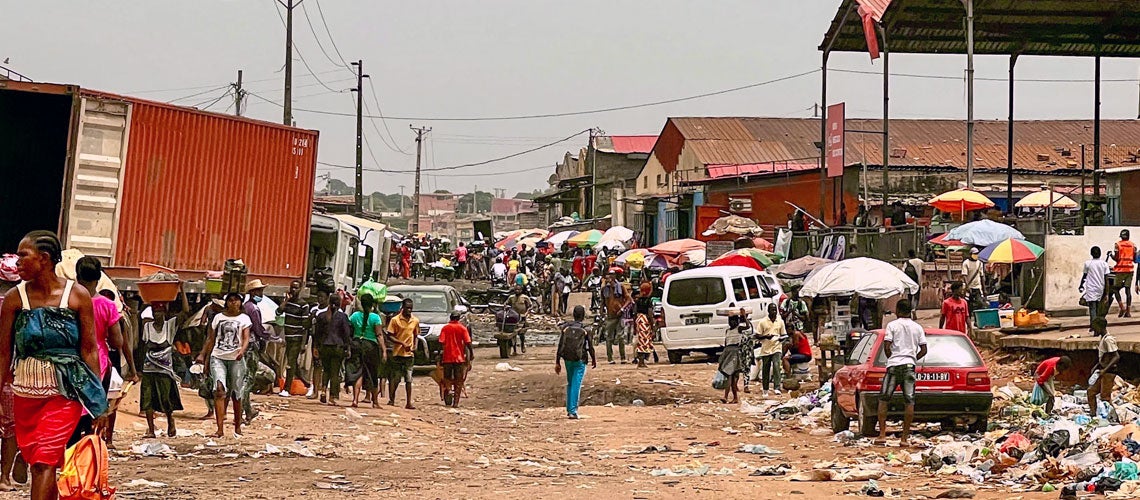 Angola market
Angola market
A statement by a young woman in Luanda, Angola echoes an experience faced by countless others: “A woman has to earn everything in life. She can’t expect it from a man because then she will never excel. So, my mother would bring me to the market... Teach me how a woman should start to excel in life, not just by “hoping” to have a lot of money, but by working.”
These words were captured in a the recent study Navigating, Education, Motherhood, and Informal Labor: The Experiences of Young Women in Luanda and they underscore two things about the young women who participated in this study: the pressing economic needs and challenges they face to pursue a way out of poverty, and their strong resilience.
The numbers paint a grim picture: whether in education or employment, women are at a disadvantage in Angola. Angola stands out in Africa for exceptionally high rates of teenage pregnancy (35% of girls ages 15 to 19 are either pregnant or already gave birth), child marriage (30% of women ages 20–24 were first married by age 18), and lower quality jobs than similarly-skilled men - 86% of employed women engaged in vulnerable jobs (defined as own-account workers and contributing family workers) compared to 67% of men.
What drives these observed discrepancies?
We asked young women and girls in Luanda themselves. This is what we found.
The challenges they face include severe structural constraints: Poverty and lack of financial means, restrictive gender norms, a high prevalence of gender-based violence (GBV), and a lack of access to public services severely limit young women’s access to opportunities and their ability to take advantage of them.
"I stopped why? Because I was no longer able to pay for school…after two months (without paying) you're not a student anymore…so they're always kicking you out of school…At the end of the month they always kick you out, because at the end of the month you have to pay the school fee.”
(School dropout, 25 years old)
High costs and inadequate school infrastructure limit schooling for both boys and girls. Public schools are overcrowded, and private schools are unaffordable for low-income populations. For both, attending school involves indirect costs that are unaffordable for many families - uniforms, materials, fees, transportation. Most families in the study could not consistently cover these expenses, resulting in uncertain and discontinuous education.
Girls face an additional layer of constraints: teenage pregnancy, demands for their time to help in domestic and care work at home, gender discrimination in access (particularly in technical schools), and GBV in schools.
“I had heard of planning but I was told that it is not very advisable for women who do not yet have a child.... It can burn the uterus or can bring some consequences and so I really preferred to use the method that my aunt taught me.” (School dropout, 21 years old)
Early pregnancy was one of the driving factors behind abandoning school for many of the participants in the study. But these pregnancies were not planned – they ‘happened to them’ due to a severe lack of knowledge about reproductive health coupled with limited access to family planning services. Feelings of shame along with economic and social pressure following a pregnancy drive young women out of school, with minimal chances of returning.
Gender norms leave women shouldering most of the domestic and economic responsibilities in many families. A lack of support from fathers or male companions compels many women to combine caregiving with earning money shortly after childbirth.
With incomplete education, childcare responsibilities, little to no support from a partner, and few employment opportunities, street vending becomes the best option for many women. The markets where many operate lack basic facilities such as sanitation and trash collection. The ‘zungueiras’ (vendors without designated stalls) navigate the city streets with their goods (and often their children), offering their wares to passersby. These women are frequently subjected to robberies and violence, both on the streets and in the markets.
"I have to walk (covered) with a cloth, the sun burns a lot here. Now you have to walk kilometer after kilometer to look for a job. And when you get to this place, … they say no, get up, no, nothing, you’re not looking to work here... They kick you out." (School dropout, 23 years old)
Yet, the voices of these women, despite their struggles, also document their resilience and strength: “I sell not because I want to, but because I have to. It’s the money I earn for my children that keeps me going,” said a 25-year-old street vendor.
Towards a solution
These interconnected challenges underscore the necessity for multisector interventions. Measures are needed in schools to support girls and young mothers’ continuing schooling and to reduce school based GBV. To reduce teenage pregnancy, it is crucial to provide sexual education and eliminate barriers to access to family planning services. Given the economic importance of microenterprises (especially street vending) for women in Luanda, measures are needed to improve markets, tackle abuse from market administrators, increase transparency of the daily market fees, and increase access to banking and financing. Finally, promoting equitable gender roles requires community-wide sensitization efforts.




Join the Conversation